
Industrial RO plants are essential for providing safe and clean water to industries, hospitals, hotels, and companies. To make the Reverse Osmosis membranes effective and durable, the raw water has to be pre-treated by removing the impurities prior to being fed into the RO plant. In this blog, we explore What Type Of Pre-Filters Are Required For Commercial RO Plants, their function, and why exactly they are so important.
Pre-Filters Are Required for Commercial RO plants since they remove sediments, chlorine, and other harmful constituents that can destroy the delicate RO membranes.
Why Pre-Filters Are Necessary for Commercial RO Plants
Physical and chemical damage is prone to the RO membrane. If they do not pre-treatment, the membrane may be closed, broken, or may be less efficient, leading to water quality and high maintenance fees.
- The role of the former-filter is to protect the RO membrane:
- Remove suspended solid and sediment like sand, dirt and rust.
- Neutralizing chlorine and other chemicals capable of destroying the membrane.
- Preventing scaling and fouling.
Thus, Commercial RO Plants Require Pre-Filters to ensure the smooth and long run of the plant.
Common Forms of Pre-Filters Utilized in Commercial RO Plants
Below are the major types of pre-filters commonly utilized before water is subjected to the commercial RO plant:
1) Sediment Filters:
Sediment filters are the first line of defense of the pre-treatment. Sediment filters remove big particles like sand, silt, dirt, and rust. Sediments can clog the RO membranes very quickly if they are not filtered out.
Sediment filters are of various micron ratings, usually between 1 to 50 microns, depending on the water quality. In RO plants used commercially, a sediment filter with a micron rating of around 5 to 10 is commonly used to strike a balance between effective filtration and flow rate.
2) Activated Carbon Filters:
Activated carbon filters remove chlorine, chloramines, and other organic chemicals from water. Chlorine is harmful to RO membranes as it causes chemical degradation, shortening their life span.
Activated carbon works by adsorbing the chemicals on its surface, hence preventing them from reaching the membranes. Activated carbon filter also improves water’s odor and flavor, something important in commercial application.
3) Multimedia Filters:
Sometimes commercial RO plants utilize multimedia filters with multiple layers of media, for instance, gravel, sand, and anthracite. These filters are efficient in the removal of suspended solids and provide more turbidity reduction than sediment filters.
Multimedia filters are useful when the feed water has high suspended matter or is being supplied from surface water or bore wells.
4) Water Softeners:
Where feed water is hard, water softeners are used as pre-treatment to prevent scaling on RO membranes. Hard water contains calcium and magnesium ions that cause scaling.
Pre-filters use ion-exchange resins for replacing hardness ions by sodium ions to protect the RO membranes and improve efficiency.
How Pre-Filters Co-operate in Commercial RO Plants
In typical commercial RO setup, there are pre-filters installed in stages to provide maximum protection:
- Sediment Filter Stage: Eliminates large particulates to prevent clogging of downstream filters.
- Multimedia Filter (if used): Removes finer suspended matter and turbidity.
- Activated Carbon Filter: Removes chlorine and organic contaminants.
- Water Softener (if required): Softens water to prevent scaling.
This staged pre-treatment ensures water going into the RO membranes is as clean as possible, helping to maintain flow rates and improve membrane life.
Why Proper Selection of Pre-Filters Is Important
The correct type and sequence of pre-filters are source water quality dependent. For example, groundwater is likely to have hardness issues for which softeners are required, while surface water might need multimedia filtration for excessive turbidity.
If Pre-Filters Are Required for Commercial RO Plants are not selected properly:
- Membrane damage will result in repeated replacements.
- Efficiency of the RO plant will decrease.
- Operational costs will rise.
- Water quality might not meet the required standards.
Therefore, a detailed water analysis before installing the RO plant is essential to design the right pre-filtration system.
Maintenance of Pre-Filters in Commercial RO Plants
Pre-filters need regular maintenance to perform well:
- Sediment filters should be replaced when clogged.
- Activated carbon filters must be replaced periodically to ensure chlorine removal.
- Multimedia filters must be backwashed to purge deposited solids.
- Water softeners require regeneration on a periodic basis.
Omission of maintenance may lead to pre-filter failure, affecting the overall RO plant performance.
Conclusion
Pre-filters are required for commercial RO plants to protect RO membrane sensitive by damage caused by depression, chlorine, hardness and other contaminants. Sediment filters, active carbon filters, multimedia filters and water softener are the most widely used former-filters.
Feed is required to select the correct pre-filter combination, efficient performance, long-term membrane life and better water quality based on the quality of water. Filter maintenance is important for continuous performance.
If you set up a commercial RO plant, make sure that you interact well with your manufacturer or water treatment specialist on pre-affiliation needs. This will prevent maximum returns on expensive downtime and investment.
Do you need an advice or assistance on selecting the best water and waste water treatment unit? We have solutions for all your problems!
Let us know your problem, our experts will make sure that it goes away.
For an assistance or related query,
Call on +91-9650608473
Or write us at enquiry@netsolwater.com
